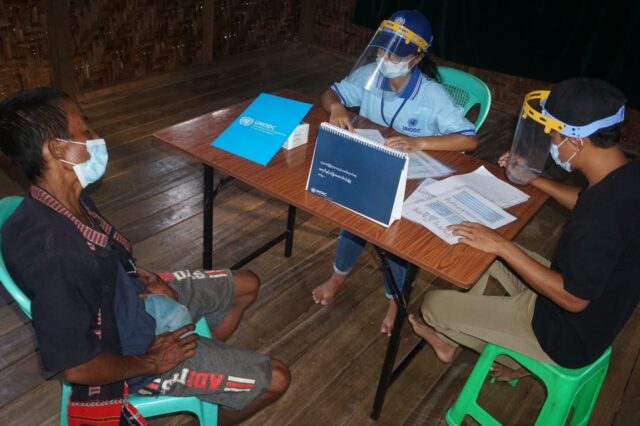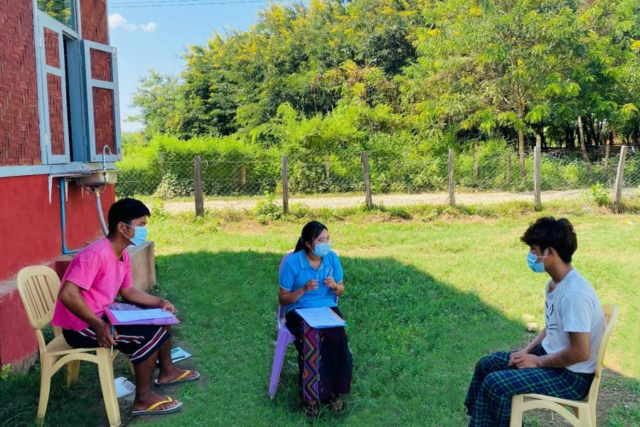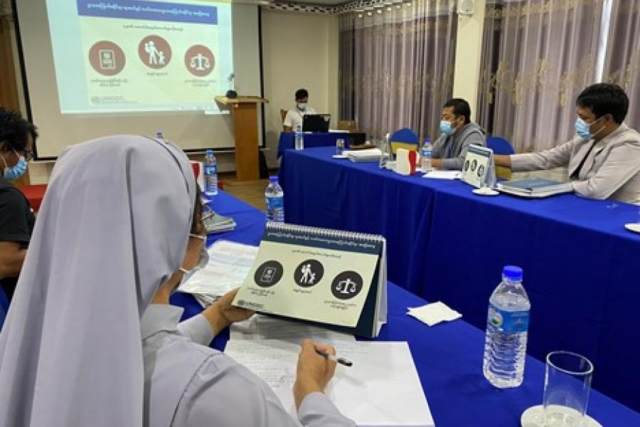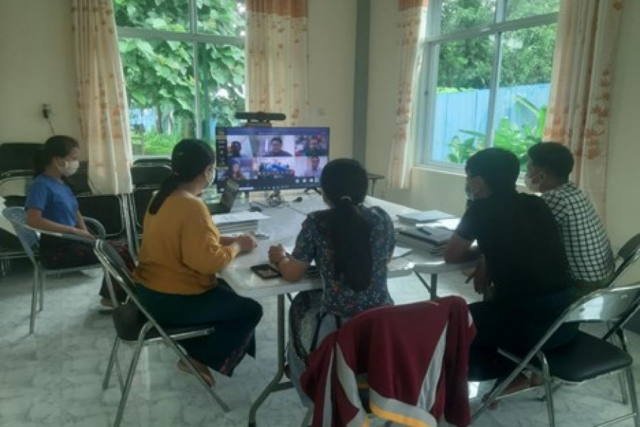UNODC supporting community-based treatment for people who use drugs in Kachin IDP camps and surrounding communities


Caption: UNODC field staff and volunteers from IDP camps are screening the risky behavior of drug use among people who use drugs in IDP Camps from Myiktyina, Kachin State, Myanmar. Photo: © UNODC
UNODC in Myanmar aims to prevent drug abuse, enhance access to community-based drug treatment & reintegration services, especially among vulnerable populations.
“My son wanted to stop using drug, but we did not know how to help him, but through the advice received at the Rebirth Rehabilitation Service Center my son is now healthy and has got a second chance to build back his life better and I am really thankful to the drug treatment and rehabilitation services in the community,” said U Naw Tawng, a concerned father from Myitkyina, Kachin state.
Stories like U Naw Tawng’s show the impact of illicit drug use on people especially in vulnerable communities such as IDP camps and surrounding areas in Myitkyina, where UNODC continued to deliver and support community based drug prevention, treatment and services for people suffering from drug addiction problems.
Illicit drug use is having a significant impact on people’s health and wellbeing, and negatively affects the long-term prospects for an eventual return of the expanding numbers of IDPs to their home areas. Aiming to minimize the adverse health and social consequences of drug abuse in Kachin state’s IDP camps and surrounding areas, UNODC’s experts work directly with and mentor volunteers in IDP camps to ensure people who use drugs can access health-centered services within their community setting.

Caption: UNODC field staff and volunteer from IDP camps are screening the risky behavior of drug use among people who use drugs in an IDP Camp in Myiktyina, Kachin State, Myanmar. Photo: © UNODC
Ze Hkawng, an ex-drug user from Mawhpawng Lhaovo camp, overcame drug addiction with the help of community-based drug treatment and services programme. He has been trained by UNODC and is volunteering at the programme now actively. While screening risky drug behavior, he said
“I was happy when I heard about the community-based drug treatment and services initiated by UNODC because I did not know how to get help to stop using drugs. The programme helped me to rid myself of the addiction and I am now healthy and happy. I think many youths like me need help, so I hope this programme will help them just like it helped me.”
Since October 2021, the program supported the referral of 30 clients to government, INGOs and NGOs run service centers based on the client’s needs such as methadone maintenance therapy, HIV testing, Hepatitiis screening, counselling services, as well as community based treatment and rehabilitation services in coordination and cooperation with relevant partners. To reach more people, UNODC has started to roll out hybrid online training of trainers to participants from local faith-based organizations, enabling them to pass on their knowledge on a community-based approach to drug dependence treatment and services to members of the community.

Caption: UNODC’s Hybrid Online Learning on Community-Based Treatement and Care Services for people who use drugs by CBOs and field staff in Kachin State, Myanmar. Photo: © UNODC
With their new knowledge, they will be able to conduct training sessions such as the one organized by UNODC’s field staff for volunteers (half of whom were female and have of whom were male) from IDP Camps in Myitkyina together with NGOs and faith-based organizations working on drug and health areas. The workshop improved the skills of the IDP camps volunteers to screen and refer people who use drugs to the community based services, while at the same time facilitating improved networking and coordination among services providers and the volunteers.

Caption: UNODC Hybrid Online Learning on Community-Based Treatment and Care Services for People who use drugs by CBOs and field staff in Kachin State, Myanmar Photo: © UNODC
Mrs. Hkawn Ra, a camp leader from Du Kahtawng camp, said that joining the workshops has provided them with information on the referral pathway for service delivery, not only in the camp but also to surrounding areas as well. Mr. Joseph, a camp leader from Manhkring IDP camp, agreed with Mrs. Khawn Ra and added that the training also provided urgently needed assistance to the volunteers in their camps who will assist with drug-related issues in the camp.
The trainings are part of UNODC’s collaboration with NGOs and faith-based organizations working on drug prevention, treatment, harm reduction, drug rehabilitation and social reintegration services, aimed at strengthening capacities to provide community-based services in particular in IDP settings. In Kachin, the programme focuses on preventing drug use and addressing drug-related issues among people in IDP camps and surrounding communities in three selected area of Kachin state: Myitkyina, Waimaw and Mogaung.
In line with international standards and a balanced approach to drug control as reflected in an outcome document during the 2016 UN General Assembly Special Session on the world drug problem, UNODC in Myanmar aims to prevent drug abuse, and enhance access to community-based drug treatment and reintegration services, especially among vulnerable populations.

